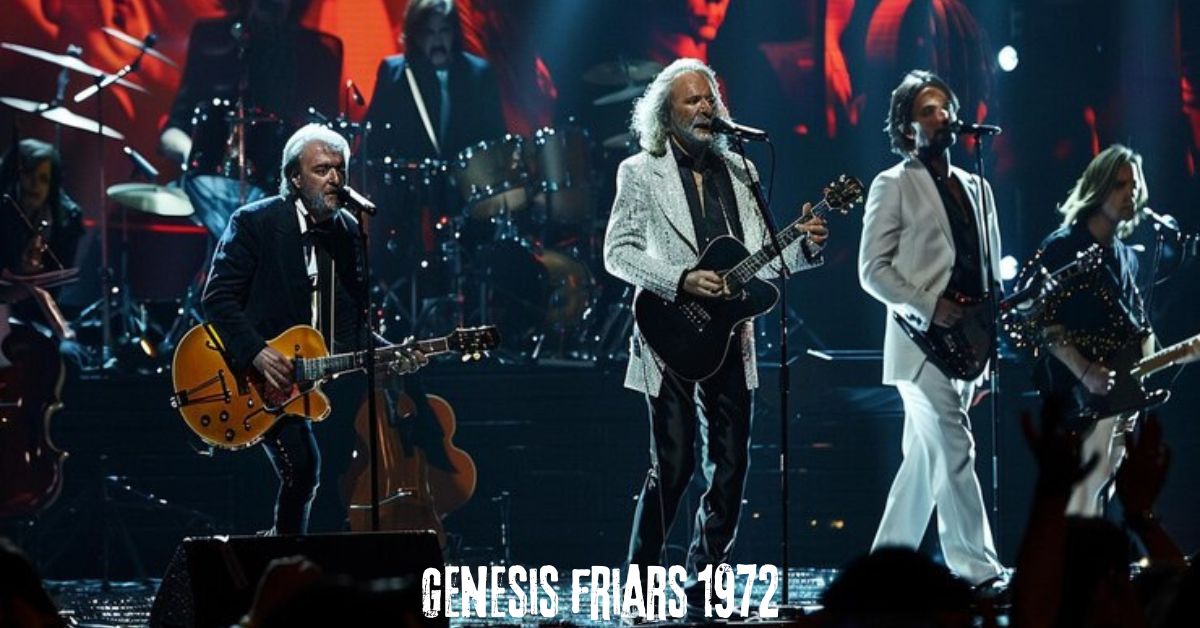Genesis Friars 1972 is one of the most momentous events in progressive rock history. This landmark moment showcased the inventive and creative attitude of one of the most important bands of the period, marking a crucial chapter in the genre’s growth. An iconic example of creative inquiry and musical development, the Genesis Friars 1972 concert is a must-see for progressive rock aficionados and music lovers everywhere. In this essay, we’ll take a closer look at Genesis Friars 1972 and how it changed the band, progressive music, and the world as large.
What is Genesis Friars 1972?
In 1972, the British progressive rock band Genesis played a seminal show at the Friars Aylesbury venue, which is known as Genesis Friars 1972. The band’s developing sound and stage presence were on full display during this legendary performance, which is also considered a watershed moment in the history of the progressive rock movement. The Friars Aylesbury show was a watershed point in progressive rock history and a watershed occasion in Genesis’ early career.
You Might Also Like: Back Casting Room
Context of the Era
Progressive rock underwent a radical transformation in the early 1970s. By using intricate arrangements, conceptual themes, and complicated time signatures, bands were pushing the limits of musical creation. Genesis, with their one-of-a-kind combination of musical complexity and dramatic flair, was a pioneer in this field. A pivotal moment in the band’s evolution, the 1972 Friars Aylesbury concert came at a period of great upheaval and progress.
The Genesis Lineup of 1972
If you want to know how significant the Friars Aylesbury performance was, you have to think about the Genesis lineup back then. The unique sound and theatrical appearance of the band were greatly influenced by the 1972 lineup.
Peter Gabriel (Vocals, Flute)
Frontman Peter Gabriel was renowned for his dramatic and theatrical performances. His distinctive singing style and innovative use of stage props helped establish the band’s sound. At Friars Aylesbury, Gabriel demonstrated his developing position as a performer by combining story with song in an unforgettable performance.
Tony Banks (Keyboard, Piano)
Keyboardist Tony Banks had an important role in creating Genesis’s intricate and orchestral sound. The band’s arrangements relied heavily on his melodic and harmonic contributions, which he delivered on piano and keyboards. The highlight of Banks’s performance at Friars Aylesbury was undoubtedly his delicate piano work.
Mike Rutherford (Guitar, Bass Guitar)
Genesis were able to experiment with a broad variety of tonalities and dynamics thanks to Mike Rutherford, who played both guitar and bass. His solos were lyrical and powerful, and he helped shape the band’s style. Friars Aylesbury was a great venue for Rutherford to display her musical variety and talent.
Steve Hackett (Guitar)
In 1971, Steve Hackett became a member of Genesis as a guitarist, and by 1972, his impact was already noticeable. The band’s sound was elevated by Hackett’s unique guitar approach, which was defined by complex solos and effects. Friars Aylesbury was a watershed moment in his growth as a band member for him.
Phil Collins (Drums, Percussion)
Genesis’ rhythm section was incomplete without Phil Collins, who had been there since 1970. The intricate arrangements of the ensemble were built around his drumming and percussion. Friars Aylesbury was a showcase for Collins’s developing skill and imagination on the drums.
Must Visit: mizpedia
The Friars Aylesbury Venue
During the 1970s, The Friars Aylesbury was well-known as a live music venue that featured performances by several prominent artists. The compact setting created a one-of-a-kind performance environment, fostering a strong bond between the band and the audience. Friars Aylesbury provided Genesis with a chance to engage with their fans on a more intimate level while also giving them a platform to explore.
Significance of the Venue
The layout and acoustics of the arena enhanced the performance as a whole. The intimate setting of the venue let the audience feel even more a part of the action, heightening the effect of Genesis’s musical and dramatic production. Those lucky enough to be there will always remember the unforgettable performance at Friars Aylesbury.
The Performance: A Landmark in Progressive Rock
For both Genesis and progressive music as a whole, the 1972 Friars Aylesbury concert was a watershed point. The performance highlighted the band’s musical talent and their aspirations for creative growth via the presentation of their ever-changing sound and theatrical manner.
Setlist and Highlights
A combination of Genesis’s earlier albums and songs from their soon-to-be released album were on the lineup for the Friars Aylesbury event. The following stood out:
- “The Musical Box” – A complex and dramatic piece that exemplified the band’s storytelling and musical sophistication.
- “Watcher of the Skies” – A powerful and atmospheric track that showcased the band’s ability to create immersive soundscapes.
- “The Return of the Giant Hogweed” – A dynamic and energetic song that featured intricate arrangements and vivid imagery.
These songs and others like them showcased the band’s dedication to innovative progressive rock and making each performance special.
Theatrical Elements
At Friars Aylesbury, Genesis wowed the audience with their dramatic production, complete with lavish costumes, sets, and special effects. The theatrical flare that Peter Gabriel brought to the performance via his use of stage props and costumes elevated the whole experience for the audience. One of the band’s defining characteristics and a characteristic of their live performances was their dedication to fusing musical elements with visual narrative.
Impact on the Band and Progressive Rock
The Friars Aylesbury show in 1972 was a watershed moment for Genesis and progressive music as a whole. This performance further cemented the band’s status as genre trailblazers and showcased their maturing creative abilities.
Influence on Genesis’s Career
Genesis reached a turning point in their career with the Friars Aylesbury concert, which showcased their progress as entertainers and musicians. The band’s reputation for intricate and captivating live performances, which would characterize their later tours, was solidified during the event. They were more well-known and influential in progressive rock after their Friars Aylesbury concert.
Legacy in Progressive Rock
One of the most seminal moments in progressive music history occurred when Genesis performed at Friars Aylesbury. Many subsequent progressive rock performers owe a debt of gratitude to the band for shaping the genre with their groundbreaking live performances and unique musical approaches. As an example of the influence of progressive rock and its creative potential, the performance is still considered a watershed event in the genre’s history.
The Legacy of Genesis Friars 1972
Both current and former Genesis Friars 1972 listeners and scholars feel the album’s enduring impact. The show is still a landmark in the band’s canon and a demonstration of progressive rock’s innovative spirit.
Preservation and Documentation
Thanks to recordings and documentation, music lovers and historians may relive the historic concert at Friars Aylesbury whenever they choose. The live performance style and sound development of the band at this time may be better understood with the help of these recordings.
Influence on Future Generations
Genesis Friars 1972 has an effect that goes well beyond the theater. New progressive rock artists are constantly being inspired by the band’s groundbreaking live performances, which have impacted and inspired generations of musicians. The show is a constant reminder of the importance of original thought and the lasting impact of seminal musical works.
Conclusion
In 1972, with the release of Genesis Friars, the band showcased their ingenuity and creative development, marking a key point in progressive rock history. Genesis reached a turning point in their career and genre development with the performance at the Friars Aylesbury venue. The band’s commitment to expanding progressive rock’s boundaries was on full display throughout the performance, which included intricate musical arrangements, dramatic touches, and a compelling set list. This groundbreaking performance has had and will have lasting effects on progressive rock.
FAQs
1. What was the Genesis Friars 1972 performance?
The Genesis Friars 1972 performance, a notable live event by British progressive rock band Genesis, took place at the Friars Aylesbury in 1972. This performance is notable for showcasing the band’s evolving sound and theatrical style during a pivotal moment in their career.
2. Why is the Friars Aylesbury venue important in this context?
The intimate setting of the Friars Aylesbury was a standout location for Genesis in the 1970s, adding to their imaginative and dramatic show.
3. Who were the members of Genesis in 1972?
The lineup of Genesis in 1972 included:
- Peter Gabriel (Vocals, Flute)
- Tony Banks (Keyboard, Piano)
- Mike Rutherford (Guitar, Bass Guitar)
- Steve Hackett (Guitar)
- Phil Collins (Drums, Percussion)
4. What were some highlights of the Genesis Friars 1972 performance?
Notable highlights of the performance included:
- “The Musical Box” – Known for its complexity and dramatic presentation.
- “Watcher of the Skies” – A powerful track showcasing atmospheric soundscapes.
- “The Return of the Giant Hogweed” – A dynamic and energetic song featuring intricate arrangements.
5. How did the 1972 performance impact Genesis?
Genesis’s landmark 1972 performance at Friars Aylesbury contributed to the formation of their reputation for lavish live shows. It contributed to their growing popularity and solidified their position as innovators in the progressive rock genre.





One thought on “Exploring Genesis Friars 1972 : A Landmark in Progressive Rock History”